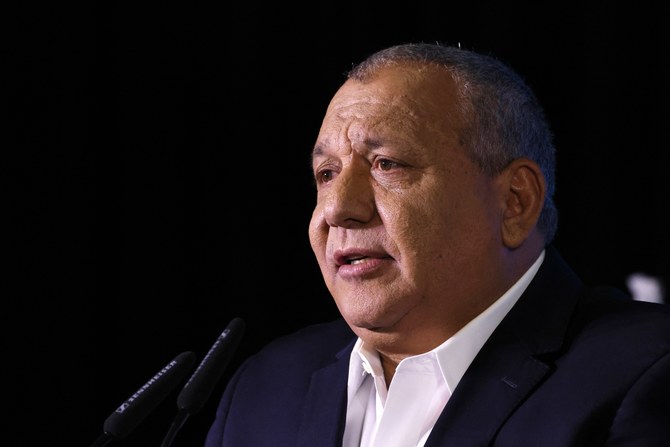Yossi Mekelberg
In an Israeli government stuffed with hawks, far-right extremists and self-serving politicians, Gadi Eisenkot, a war Cabinet minister and former army chief of staff, is something of a revelation in his thoughtfulness and honesty. He is a former general with plenty of military experience but is a novice in politics and was elected to the Knesset only at the last general election after he joined the center-right National Unity party led by Benny Gantz.
Until Oct. 7, he and his party were in opposition, but in its aftermath they did not want to leave the decision-making in these difficult times in the hands of a prime minister charged with corruption and his dangerously delusional ultra-right coalition partners; and so they joined the war Cabinet. Eisenkot looks like prime minister material every step of the way, with his strategic thinking and understated authority. As part of a government that lacks direction and is being carried away by its own extreme and irresponsible populist rhetoric, it was refreshing to hear him, in a wide-ranging interview on Israeli TV last week, present more balanced views and warn against allowing trigger-happy ministers to dictate the direction that Israel is currently taking. This was especially remarkable considering that, only last month, his son was killed in the fighting in Gaza and he and his family are still in mourning.
Nothing in the interview violated the collective responsibility of all who serve in government, but what was said should still keep most listeners in Israel and abroad awake at night. More than disclosing new information, Eisenkot confirmed what we all suspected – that Israel is operating with no overall strategy in relation to the war in Gaza and there is no grasp of the complex regional picture. By the same token, he was frank enough to admit that the government is not telling its own people the truth about what is happening in Gaza and whether it is getting any closer to achieving its war objective; reading between the lines, it is not. It is an open secret that there is little to no trust between the different components of this government in terms of motivation and judgment in conducting this war, which creates an ominous volatility. Hence, one of Eisenkot’s most revealing disclosures on Channel 12’s Uvda (“Fact”) program was that the presence of his National Unity party had prevented an almost instant, massive attack on Hezbollah in Lebanon, which would have meant Israel fighting on two fronts.
This revelation makes it clear that, from Day 1 of this conflict, Netanyahu and the hawks in his government, as much as senior Israeli army commanders, locked themselves into another dangerous misperception of what military power can, or more importantly cannot, achieve. And because of their initial appalling failure to foresee and prevent the Hamas attack, they sought to redeem themselves by military adventurism and/or they saw an opportunity to do something they have wanted to do for a long time. The tension on the northern border has been a security concern for many years and, back in 2018, Israel decided to take on Hezbollah in Lebanon, embarking on “Operation Northern Shield,” exposing and thwarting the organization’s cross-border attack tunnels from Lebanon. For many months, long before Oct. 7, occasional skirmishes with Hezbollah had taken place along this border. However, conditions changed after the Hamas attack and a full-blown confrontation with Hezbollah, as Eisenkot warned the Cabinet, “would have fulfilled (Hamas’ Gaza leader Yahya) Sinwar’s strategic vision” of bringing about a regional war.
For many years, Israel’s strategists were more concerned with developments in Lebanon than with either the West Bank or Gaza, which were each regarded as “under control.” We may never know exactly what the intentions of Hamas’ leadership were in targeting civilians in such a horrific manner on Oct. 7, unless it was as bait to draw an excessive response from Israel in the hope that this would galvanize the so-called Axis of Resistance and even more moderate Arab countries to unite against Israel. And, first and foremost, to lure Hassan Nasrallah and Hezbollah to open a northern front. At a time when emotions of fear, anger and revenge coalesce with the need to ensure a country’s immediate and long-term strategic interests, its leadership must contain its emotions and narrow political calculations in favor of seeing the bigger picture. Hezbollah has undoubtedly been provoking Israel, but it is mainly engaging in symbolic and very limited cross-border skirmishes, despite the occasional escalation when either side feels that their enemy is crossing a certain red line.
In hindsight, the brakes on the Israeli government’s actions in the form of the National Unity party proved to be crucial and may have avoided a regional war that might have united Iran, Iraq, Syria and the Houthis in Yemen and led to them joining forces with Hamas and Hezbollah. Eventually, however, National Unity will have to leave the coalition and demand a general election. Moreover, we learned from Eisenkot something many of us suspected from the beginning of this war, mainly because of the opening conditions: that there are too many in the Israeli government who do not comprehend the limitations of the use of force – a misunderstanding that usually leads to the prolonged and excessive use of it. Moreover, whereas for the wider public the release of the hostages is the No. 1 priority, this is not necessarily the case when it comes to the prime minister and his original partners in this coalition.
A moral government should take the view that protecting its citizens takes precedence over eliminating an enemy. For now, Israel is not prioritizing the safety and return of the hostages; instead, it is entrenching its soldiers in the killing fields of Gaza with no exit plan and no mechanism to facilitate one. It carelessly lacks any strategic vision of what a desirable future scenario for Israel might be. This point is especially concerning, as the ultra-right in government are calling for the reoccupation of Gaza and the construction of Israeli settlements there, and soon Netanyahu might need to cave in to such demands in order to stay in power. Eisenkot’s interview has injected a sense of realism regarding both the dangers ahead and the costs this war has already incurred.
More significant is that there is a need to come clean and acknowledge that a war of this kind can achieve only a limited strategic objective, while the country’s long-term goals can only be accomplished through negotiation and the arduous process of peace-building. But is there a constituency that is ready to listen to this message?







